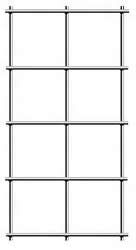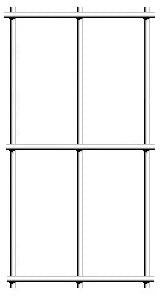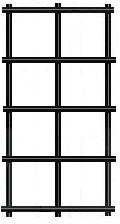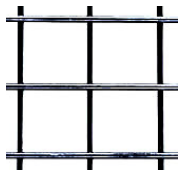Understanding Wire Gauges and Their Applications
Posted by Ayokunle Ademola-John on
Wire gauges are a fundamental aspect of selecting the right wire fencing material for your project. Whether you're installing a garden fence, securing livestock, or building enclosures, understanding wire gauges can help you make informed decisions about durability, flexibility, and cost.
This post provides a comprehensive guide to wire gauges, including how they are measured, what the numbers mean, and the best applications for different gauges.
1. What is Wire Gauge?
Wire gauge refers to the thickness or diameter of a wire. It determines the wire's strength, flexibility, and weight. In the U.S., the American Wire Gauge (AWG) system is commonly used, while other countries may use metric measurements or the Standard Wire Gauge (SWG) system.
2. How is Wire Gauge Measured?
- Inverse Relationship: The gauge number is inversely proportional to the wire diameter. A lower gauge means a thicker wire, while a higher gauge indicates a thinner wire. For example, 8-gauge wire is thicker and stronger than 16-gauge wire.
-
Measurement Units: Wire gauge is typically measured in inches or millimeters. For example:
- 8-gauge: 0.162 inches (4.115 mm)
- 14-gauge: 0.080 inches (2.032 mm)
- 20-gauge: 0.032 inches (0.812 mm)
3. Common Wire Gauges and Their Properties
8-Gauge Wire
- Strength: Thick, heavy-duty, and highly durable.
- Applications: Suitable for industrial uses, security fencing, and enclosures for large animals.
- Pros: Resists deformation under heavy pressure.
- Cons: Less flexible and more expensive than thinner gauges.
12- to 14-Gauge Wire
- Strength: Strong enough for most agricultural and residential fencing.
- Applications: Used for field fencing, garden fences, and small animal enclosures.
- Pros: A good balance of strength and cost-effectiveness.
- Cons: Slightly less durable than 8-gauge for high-pressure situations.
16- to 20-Gauge Wire
- Strength: Lightweight and flexible.
- Applications: Ideal for chicken wire, temporary fences, or light barriers.
- Pros: Easy to handle, inexpensive.
- Cons: Less durable and prone to damage under pressure.
4. Choosing the Right Wire Gauge for Your Project
Security Fencing
- Recommended Gauge: 8- to 12-Gauge.
- Reason: Thick wires resist cutting and provide high durability.
Garden and Decorative Fencing
- Recommended Gauge: 14- to 16-Gauge.
- Reason: Strong enough to protect plants without being overly rigid.
Animal Enclosures
- Recommended Gauge:
- Large Animals (e.g., horses, cattle): 12- to 14-Gauge.
- Small Animals (e.g., chickens, rabbits): 16- to 20-Gauge.
- Reason: Larger animals require stronger wire to withstand force, while smaller animals need tighter mesh openings with thinner wire.
Erosion Control and Gabions
- Recommended Gauge: 8- to 10-Gauge.
- Reason: Thick wire provides stability and long-term durability in retaining walls or erosion control applications.
5. Factors to Consider When Selecting Wire Gauges
- Purpose: Define the primary use of the wire—security, animal containment, or decoration.
- Environment: Coastal or humid environments may require vinyl-coated or stainless steel wires to prevent corrosion.
- Budget: Thicker wires tend to cost more, but they last longer, making them more cost-effective in the long run.
- Flexibility: For uneven terrain or temporary fencing, thinner and more flexible gauges are easier to work with.
6. Wire Gauges in Welded vs. Woven Wire
- Welded Wire: Often uses 12- to 16-Gauge for general fencing. Welded intersections make the mesh rigid, so thicker wire is ideal for strength.
- Woven Wire: Commonly ranges from 14- to 20-Gauge, providing flexibility for agricultural or temporary uses.
For more details on these mesh types, check out our guide to welded vs. woven wire mesh.
7. Frequently Asked Questions
Q: How does wire gauge affect fence lifespan?
- Thicker gauges are more resistant to wear and tear, making them ideal for long-term projects in high-stress environments.
Q: What’s the best gauge for pet fencing?
- For dogs, 12- to 14-gauge welded wire works well, while smaller pets like rabbits may require 16- to 20-gauge woven wire.
Q: Can thinner gauges work in outdoor environments?
- Yes, but ensure the wire is galvanized or vinyl-coated to prevent corrosion.
8. Explore High-Quality Wire Fencing at Louis Page
At Louis Page, we offer a wide variety of wire gauges in welded wire, woven wire, and vinyl-coated options. Whether you’re looking for heavy-duty fencing for industrial use or lightweight solutions for gardening, we’ve got you covered.
📞 Call us at 978-486-3116 or explore our products online: Shop Welded Wire Fence.
Conclusion
Understanding wire gauges is crucial for selecting the right fencing material for your project. By considering the strength, flexibility, and application of different gauges, you can ensure a successful and durable installation. For expert advice and premium fencing products, trust Louis Page—your partner in fencing since 1893.
Share this post
- Tags: american made, deer fence, wire fence, wire mesh





